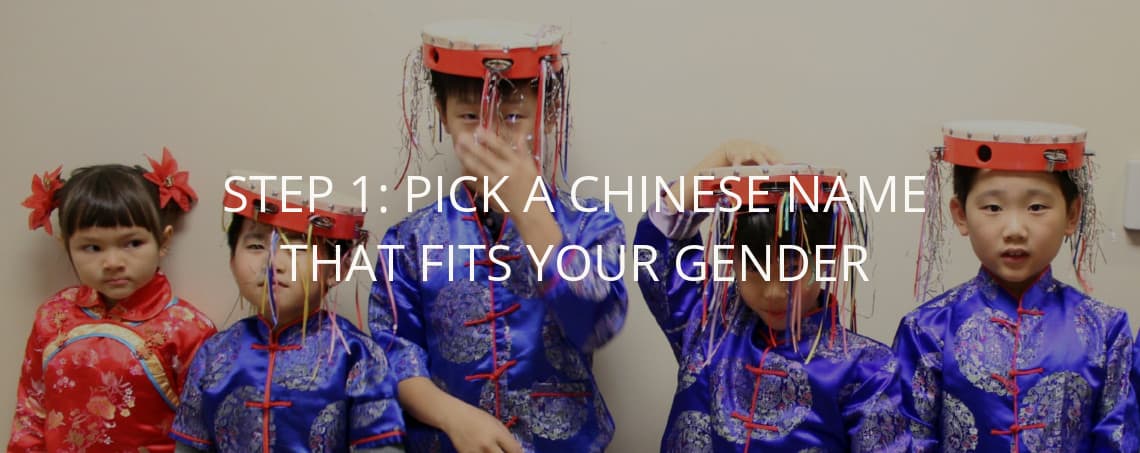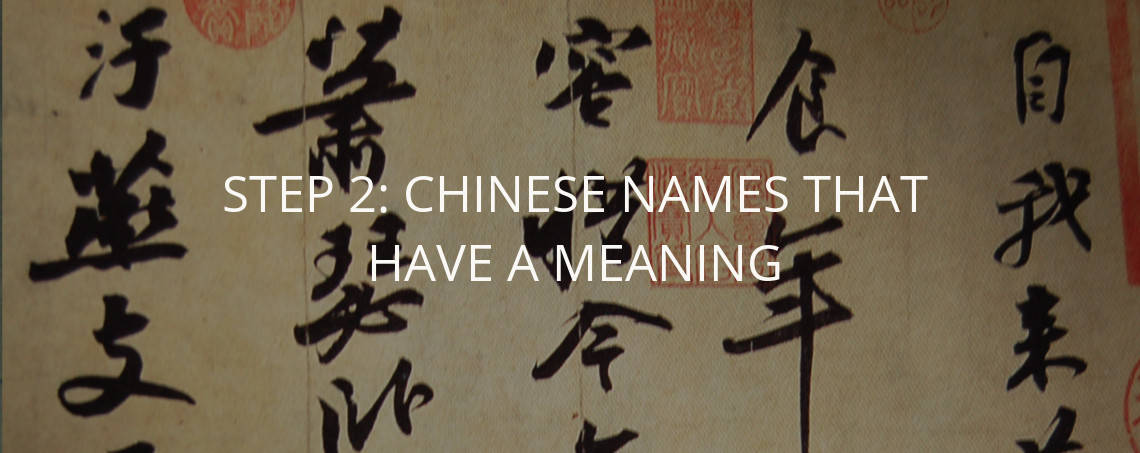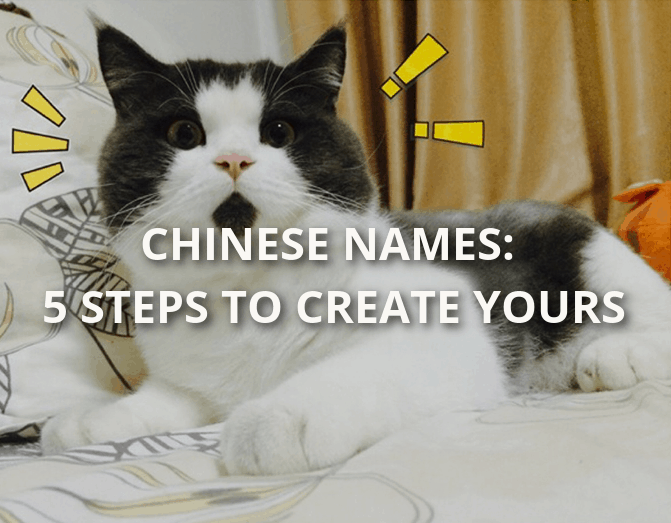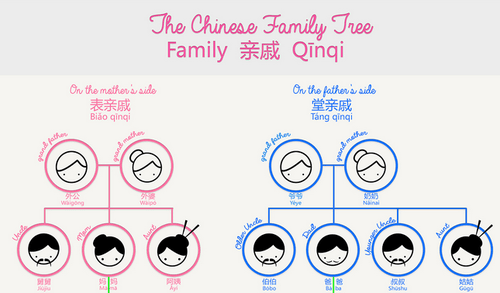Living the life in China but still being considered as a Laowai? Well, it’s time for you to get yourself a Chinese name. Chinese names are a great way to show you want to fit in Chinese society… that is if you choose your name well! So we put together a 5-step guide to help you choose the perfect Chinese names according to your personality or your taste. All you have to do is to keep a paper and a pen next to you and write down your ideas as you go along.
Have you noticed that Chinese people always have a western name? They believe it’ll help them fit in better overseas, and it’s a great idea to do the same as them when you move to China. Chinese names are the key to being accepted and truly immersed in China.It’s also very fun to create one’s name. Follow this guide, step by step, so you don’t make any faux-pas and share with us the Chinese names you pick!
🏮 Ninchanese is an incredible app for learning Chinese! 🏮
” I actually graduated from the University of Edinburgh with a MA in Chinese.
I’ve used Ninchanese daily, and it has helped me a lot! “
– Connor, Ninchanese User
Try Ninchanese, an award-winning method to learn Chinese today:
Start Learning Now
Why finding the right Chinese names matter
When it comes to choosing Chinese names, foreigners must be careful to not pick the wrong name. When Chinese parents choose a name for their child, they make sure to pick the right one as it impacts the child’s future. The same applies to you, choosing your Chinese name will also have an impact on your future and your relations.
A good Chinese name will show you took the time to reflect on what Chinese names entail, were respectful of Chinese traditions, and didn’t just use a random Chinese names generator. So, read on and learn the keys to finding and creating the right new Chinese name for you.

Step 1 for good Chinese names: Pick a Chinese name that fits your gender
Chinese parents want to give their children names that are full of the characteristics they hope their children will have when growing older. Based on their child’s gender, their choice will be different, just like in the Western World.
Boys are given Chinese names with “boy” characteristics, and girls have girl-sounding names. For instance, traditional Chinese boy names are related to strength and prosperity. Girls are traditionally given names that are evocative of beauty, grace and flowers. You’ll never run into a Chinese boy named 茉莉 mòlì Jasmine, for example. Can you imagine? His life would be ruined, he’d probably feel ashamed and people would probably laugh at him.
The same goes for you: when choosing your Chinese name, don’t pick a name that doesn’t fit your gender. Or do so at your own risk and be warned that Chinese people may stare at you and think your name is strange.
Now that we have the gender-issue out of the way, let’s move on to the different options you have to build your Chinese name. The three main ways of picking a name in Chinese are :choosing a meaningful one, a good-looking one or a name that sounds like yours. Let’s start with picking a name for its meaning.

Step 2 for good Chinese names: Choose a Chinese name that has a meaning
One way of finding yourself a Chinese name is to pick a name that sounds nothing like your name but has a strong meaning. It’s a common way to pick a name. Based on your character and your personality, you can easily find Chinese words and Chinese characters that will suit you and your unique traits.
For example, if you are a gentle, nice and sweet-mannered girl, I suggest something like 淑婉 shū wǎn. It could fit you perfectly as it means: tender, graceful and virtuous.
You’re a smart and exceptional boy? In that case, 明杰 could be a cool name for you. míng means intelligent, reasonable and clear-sighted and 杰 jié means outstanding. This name should definitely make a good impression.
Meaningful names are always a good idea if you want to show off in front of Chinese people. Hehe~

Step 3 to good Chinese names: Select a name that look beautiful on paper and will make a wow impression
Some people prefer having a beautiful-looking name when written on the paper to choosing meaningful characters. So this can be another good way to choose your Chinese name. If you like this approach, then you have a broad range of good-looking characters waiting for you to pick them. “Beauty is in the eye of the beholder” as they say, so we’re leaving the choice up to you.
Want to stand out? You can also pick characters from traditional Chinese that are more complex. They’ll add some eccentricity to your Chinese names.
The name 陶淵明 Táoyuānmíng is a good example of a beautiful-in-writing name. It’s written in traditional Chinese and that makes it special. Besides, 陶淵明 was an amazing poet during the Jin Dynasty era.

Step 4 to good Chinese names: Pick a Chinese name that sound just like yours
Like your birth name and want a Chinese name that sounds the same, but in Chinese? That’s also an option. You can translate your name into Chinese. This method is quite popular method among foreigners but it’s also risky. You have to remember to make it sound like a real Chinese name as well, so it’s not weird-sounding to the Chinese natives around you.
Let’s take the name Robert to show you how “Chinesifying” your name works.
Robert becomes 罗佩 Luó pèi. Say it out loud and the magic happens. It sounds about the same, right? There’s no particular meaning added to the translation of Robert, here. But sometimes you can do both: choose a meaningful name while staying faithful to your original name.
Let’s have a little fun: These are the name of the Ninchanese Team aka. “Nincha Team”: Sarah:莎娜, Jean-Rémi: 尚海明, and Pauline: 玻琳. Mathieu didn’t have a Chinese name yet, so we picked this one for him ^^: 马修 and 斯婧’s western name is Hermione.

Step 5: Chinese names dos and don’ts
DO: pick a “short’ name
Chinese names are made of 3 characters maximum, the average is two characters.
Sometimes foreigners shorten their names and combine their first and last name so it looks and sounds better. Let’s take Melanie Hamilton from Gone with the Wind, in Chinese, her name became 韩媚兰 Hánmèilán. Hán is for her last name and mèilán is for Melanie. It was shortened so it’s easier to read and it sounds more Chinese.
DON’T go overboard: So don’t come up with a name like 伟烈伶勇武 + a last name. It would be too obvious that you made up a name by yourself.
DO: When translating your name, pay attention to the meaning of your Chinese name.
陸克文 Lù kèwén Kevin Rudd is a good example, it’s recognizable and it’s not weird for a Chinese because it doesn’t mean anything in particular.
DON’T: Ignore the meaning of your name, even if you’re going for something phonetically close to your birth name. Or you’ll end up on a list of super weird names foreigners picked, like these two:
To all the Roses out there, please, please, don’t choose 肉丝 as your Chinese name: 肉丝 Ròu sī means Slices of pork.
Boys named Daniel, we’ve also found something for you to avoid: 大牛 Dà niú big cow, yup, you heard it. Super ugly, right? Even if it’s funny, we really don’t recommend picking a name like that for everyday use.
DON’T: Something else you should avoid when picking a Chinese name for yourself is choosing a cliché Chinese name. Stereotyped names are the worst and they’ll sound very funny to Chinese people: 美花 měi huā beautiful flower is a terrible choice.
Names like 李刚 Lǐgāng, 王小明 wángxiǎomíng and 张梅 zhāng méi are already very popular Chinese names so try not to pick these and find something less used and authentic!
DO: Take your Chinese name out for a test drive before you make it official.
Another important thing to do before making your new Chinese name official, is to try it out on your Chinese friends. See if they don’t burst out laughing when you tell them, and let them check if it sounds OK in Chinese to them. A native ear is the best way to tell if you’ve given yourself a stellar or less than stellar name.
To sum up
- Pick different characters for your name based on whether you’re a girl or a boy
- Decide on how you’re going to create your Chinese name: Do you want it to be meaning based?
- Do you want it to look pretty?
- Do you want it to sound like your birth name?
- Check the do and don’t list to make sure you didn’t forget anything…
And you’ll be good to go! By following all these steps, you’ll be able to choose a Chinese name that fits perfectly. If you respect the rules, you’ll be in total immersion in China. Now it’s your turn to create your Chinese names! You can also check the most used Chinese names. Let us know below what you pick! And tell us, why did you choose those?
The Nincha Team
Stay in touch with us on Facebook, Twitter, Instagram, and Pinterest.






5 comments
Join the conversationPingback: Mandarin Weekly #65 – Mandarin Weekly (每周中文)
Pingback: Funny Chinese Nicknames Given to Western Celebrities - Ninchanese
Maggie - October 31, 2016
Hi there, would you recommend a name for me ? I am looking for something that sounds a little like my name (Magdalena shortened to Maggie). My last name is already Chinese sounding: like Xian or Xie. It means peace.
Many thanks !
ThomasMark - March 18, 2017
Hi I chose the name 龙龙 to use on Ninchanese. My partner says it is good. Another Chinese person says it is childish. I am 65 years old, so I am quite at ease being childish. My partner has a brother and a sister, both close to my age, with double character names. I haven’t thought about a surname yet. Are there problems with using the name 龙龙?My partner has a proud family name. Is there a proud family name starting with W that I can use with 龙龙?
Katie - July 24, 2019
Is 孔淑芬 a good name? My name means “pure” so I wanted something that had a similar or the same meaning.
Comments are closed.